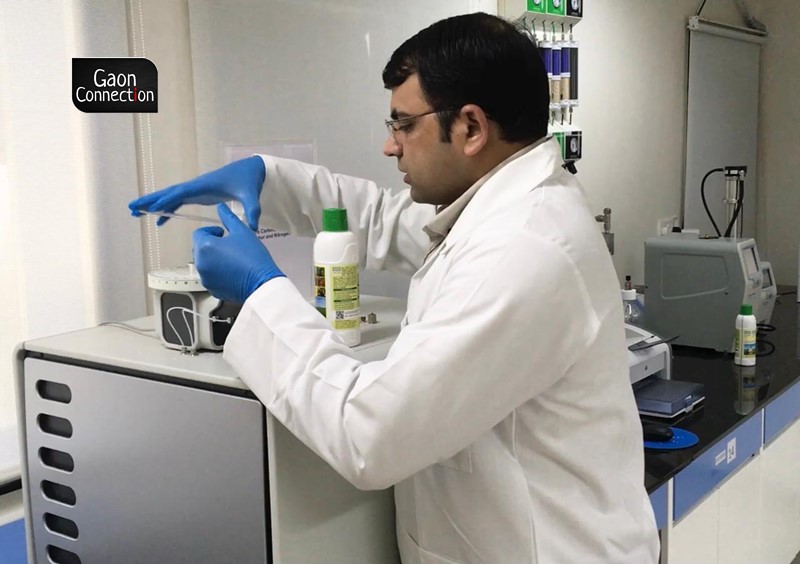Imagine replacing a 45-kilogramme sack of urea with a 500-millilitre bottle of liquid? That’s what Indian Farmers Fertiliser Cooperative Limited (IFFCO) did on May 31, when it became the first in the world to launch liquid nano urea. Making this possible was Ramesh Raliya, General Manager and Head of Research and Development of IFFCO’s Nano Biotechnology Research Centre in Kalol, Gujarat.
Also Read: A mango variety that fruits thrice a year and is suitable for kitchen gardening
Nitrogen is essential for plant and crop growth, and urea is a vital source of nitrogen. However, only 30 to 40 per cent of urea applied in fields is utilised by plants. The remainder is lost in the air and soil. It also releases harmful greenhouse gases into the ecosystem, turns the soil acidic and contaminates groundwater. Greenhouse gases are said to trap the heat in the atmosphere and warm the planet. What nano urea aims to do is to overcome these shortcomings.
It is fitting that Raliya helped with the nano urea — his parents Parasram and Bhanwari Devi are farmers in Kharia Khangar village in Rajasthan’s Jodhpur district. Raliya currently holds 15 patents in nanotechnology, including for nano urea.
Promotes efficient nitrogen absorption
As much as 80 per cent of nano urea is used by plants, explained Raliya. Explaining it in terms of chemical composition, Raliya told Gaon Connection: “Plants absorb standard urea as an ion that is unstable. Nano urea is in the form of a stable particle. As they are stable, the particles penetrate the plant and release nitrogen that the plants can absorb efficiently,” he added.
After trial and tested across, nano Nitrogen has been translated to farmers as #NanoUrea #IFFCONanoUrea. @IFFCO_NBRC https://t.co/C7cmy5d581
— Dr. Ramesh Raliya (@rameshraliya) May 31, 2021
“I’ve been working on nano urea since 2015. In 2015, I also wrote to Prime Minister Narendra Modi,” said Raliya, who has been with IFFCO since 2019. A nationwide trial of nano urea has been on since November 2019. Gaon Connection published a comprehensive feature about Raliya’s work in 2018.
इफको ने लॉन्च किया विश्व का पहला नैनो यूरिया, आधा लीटर की बोतल करेगी 1 बोरी का काम, जानिए 10 बड़ी बातें @IFFCO_PR @drusawasthi @nstomar @AgriGoI @PMOIndia #IFFCONanoUrea https://t.co/I8PhaBZHIS
— GaonConnection (@GaonConnection) May 31, 2021
Extensive testing among 11,000 farmers
According to IFFCO, it has been tested in the field for more than two years on 94 crops among 11,000 farmers in 30 agro-climatic zones in the country. It has also been tested in more than 20 institutes and agricultural universities of the Indian Council of Agricultural Research (ICAR).
The attention on nano urea is also due to increased concern over climate change, increased pollution, and rising agricultural costs. “A substantial portion of urea goes out as nitrous oxide, a greenhouse gas,” explained Raliya. Nano urea takes care of this and also does not harm soil health, he added.
Also Read: Now you can bite into crunchy apples from Mizoram and Manipur
Speaking to Gaon Connection, Raliya said: “My success as an agricultural scientist will be only when my knowledge benefits farmers and improves their quality of life.” Raliya would know why that is important, for he grew up in equally trying circumstances.
Happy to share that @RoySocChem admitted me as a member. Thanks to evaluators & those wrote to them.
— Dr. Ramesh Raliya (@rameshraliya) June 10, 2021
Due THANKS to colleagues, collaborators, ₹$ sponsors & mentors. @IFFCO_NBRC @AAQRL_Biswas @drusawasthi @iffcoyogendra @WashUengineers @IFFCO_PR @Nano_Fertilizer @wustlCMMN pic.twitter.com/7nXBMQ7wfV
Difficult childhood and inspiration to be better
“I used to walk five kilometres to the government secondary school in the village till my tenth standard,” Raliya recalled. He got to ride a cycle of his own only when he joined BSc. In the second year, he finally used a computer. “One does not need all amenities to lead a meaningful life,” he said.
In 2009, Raliya was chosen as a research associate for the World Bank’s first Agricultural Nanotechnology project at the ICAR’s Central Arid Zone Research Institute (CAZRI), Jodhpur. During his PhD, the visiting department head from Washington University in the United States examined Raliya’s research work.
“He offered me a position at Washington University, when I went to drop him off at the guest house. But, I chose to complete my PhD and go to Indian Council of Agricultural Research, by appearing for the Agricultural Scientists Selection Board,” recalled Raliya. In the US, he worked with scientists from more than 60 countries on nanotechnology research.
The nano urea will be available for purchase after June 15 this year. “One litre of water mixed with two ml of nano urea liquid must be sprayed twice throughout the life of the plant,” said Railya. And, nothing would delight him more than to see farmers like his parents benefit from the innovation.


















